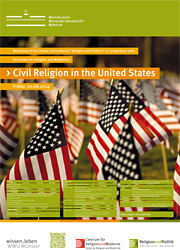Civil Religion in the United States
Workshop of the Cluster of Excellence “Religion and Politics” in cooperation with the Center for Religion and Modernity

Since Robert N. Bellah’s influential essay of 1967, the prevailing presence of civil religious symbols, values, and rituals is fiercely debated across the disciplines. The workshop addresses the analytical possibilities and limitations of applying the concept of civil religion to explain the interrelationship between religion and politics in the United States.
Accordingly, it investigates the integrating, legitimizing, and critical-prophetic functions of civil religion regarding four fields of research: 1) Rituals such as anniversaries and sport events; 2) Times of crises/Times of war such as the Iraq War; 3) Ethnic groups such as Latinos/as or Native Americans; 4) “Religious” groups such as evangelicals but also atheists. (exc)
Workshop “Civil Religion in the United States”, 20. Juni 2014, 8.45 Uhr
WWU Graduate Center
Seminarraum im EG
Schlossplatz 6
48149 Münster
Program
Friday, 20th June 2014 |
||
| 08:45–09:00 | Welcome/ Reception | |
| 09:00–10:30 | Section I: Rituals | |
| Civil Religion in U.S. National Anniversaries, 1957–1970 | Heike Bungert (Münster) | |
| Plural Visions for Plural Publics: Sport and Civil Religion in Contemporary America (and Beyond?) | Anthony Santoro (Heidelberg) | |
| 10:30–11:15 | Section II: War | |
| Sacrificial Ideology in Civil and Military Religion | Morten Brænder (Aarhus) | |
| 11:45–13:15 | Section III: Ethnic Groups | |
| A Latino Civil Religion? Exploring the Use of Scriptural Arguments by Latino Evangelical Leaders in the U.S. | Ulrike Stedtnitz (Münster) | |
| A ‘National Day of Mourning’: Thanksgiving, Civil Religion, and Native Americans | Jana Weiß (Münster) | |
| 15:00–16:30 | Section IV: Religious Groups | |
| Civil Religion and Atheism in the U.S. | Petra Klug (Leipzig) | |
| Worshipping Washington: Evangelical (Dis)Enchantment with Civil Religion | Anja-Maria Bassimir (Mainz) | |
| 17:00–18:30 | Keynote Address: Robert Bellah’s Lament: The Struggle to Define Civil Religion in Theory and Practice | Raymond Haberski (Indianapolis) |

